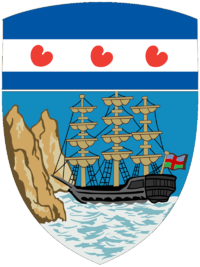Government of the South Sea Islands

| ||||
| Head of State: | Monarchy of the South Sea Islands | |||
| Lieutenant Governor: | Carla Moore | |||
| Government type: | Parliamentary Democracy under a Constitutional Democracy. | |||
| Legislature: | Legislative Assembly of the South Sea Islands | |||
| Number of MLAs: | 25 | |||
| Meeting Place: | Joseph Town, Trinity Island | |||
| Electoral System: | Single Transferable Vote | |||
The Government of the South Sea Islands is the central government of the South Sea Islands. A Parliamentary Democracy under a Constitutional Monarchy, the government is divided into Executive, Legislative and Judicial branches, whose powers and responsibilities are defined in a series of Executive and Legislative acts and conventions that collectively form a non-codified constitution.
Executive Branch
The Head of State of the South Sea Islands is His Royal Majesty King Alpin MacMartin. The monarchy of the islands is hereditary, and mirrors the succession of the Moorland monarchy. During the establishment of the South Sea Islands as an independent nation, the traditionalist leaders of the early settlers chose to retain the Nova English monarch as the Head of State of the islands, in recognition of King Josephus' contributions to their nation building efforts.
In the modern era, the monarchs of Moorland have chosen to appoint a Lieutenant Governor to exercise Executive authority in their place. Lieutenant Governors are appointed for an indefinite period and, while they are afforded certain formal courtesies in recognition of their role as the King's representative, their role is typically low-key. While appointed, it has become formal practice to hold a confirmatory election by the Legislative Assembly to solidify support for the LG.
The current Lieutenant Governor of the South Sea Islands is Carla Moore.
The primary responsibilities of the Executive branch are as follows:
- The ability to declare war and make peace, in consultation with the Legislative Assembly.
- Command the South Sea Islands Defence Forces
- Formally appoint judges to the Judicial Branch, following a nomination from the Legislative Assembly.
- Authority to dissolve the Legislative Assembly, with an election to follow within twenty working days.
- Declare states of emergency, to be confirmed by the Legislative Assembly within five working days.
While these powers are reserved exclusively for the Lieutenant Governor, they are typically exercised in line with the wishes of the Legislature.
Legislative Branch
The Legislative branch of the South Sea Islands Government is the Legislative Assembly. Members of the Legislative Assembly (MLAs) are elected for four year terms using the Single Transferable Vote system. All South Sea Islands citizens and permanent residents aged 16 or older are eligible to vote, with the exception of those serving custodial prison sentences. There are no term limits and MLAs can be reelected indefinitely.
Political parties are not permitted in the South Sea Islands, and all MLAs sit as independent members of the assembly.
The South Sea Islands are split into three divisions, each of which elects a specified number of MLAs:
- Joseph Town (5 MLAs)
- The Camp* (10 MLAs).
- The Camp is a term used to describe all areas of the islands outside of the two main urban centres.
The Legislative Assembly elects a speaker on an annual basis by a Simple Majority vote. The Speaker is responsible for overseeing the orderly conduct of Legislative Assembly meetings, but retains full voting rights for the duration of their term.
An overview of recent Legislative Assembly elections can be found on South Sea Islands Legislative Assembly elections.
The Legislature is responsible for a broad range of areas, including but not limited to:
- Health care provision.
- Education.
- Infrastructure.
- Economic Policy.
- Monetary Policy.
- Taxation.
- International Aid and Development.
- Environmental Policy.
- Foreign Policy, including concluding international treaties and agreements.
Judicial Branch
The Judicial branch of the government consists of the the Crown Court, with three judges serving staggered terms of seven years. Judges are nominated by the Legislative Assembly and appointed by the Lieutenant Governor on behalf of the monarch.
The Crown Court is the highest court in the South Sea Islands, overseeing constitutional and appeal cases from the lower courts.
Taxation
The tax system in the South Sea Islands is considered to be one of the simplest on Micras, with only two types of tax collected. The system is based on the principle of one-time taxation and the source principle, and therefore VAT and other kinds of duty are not collected, on the basis that the individuals will have paid tax on the money when earning it. The islands offers relatively few public services and therefore low levels of taxation are possible.
Individual Tax
Individual income tax is payable once per year in January, with tax rates ranging from 0% to 30% depending on income. The source principle dictates that only money earned in the South Sea Islands is subject to tax, and taxes are not payable on income derived from elsewhere. Income from salaries, investments, pensions, dividends and sales of personal assets are subject to Individual tax.
Corporate Tax
Corporate tax is charged on the net profits of businesses, at flat rate of 15% for foreign businesses and 10% for businesses headquartered in the South Sea Islands. When applied to corporate taxes, the source principle dictates that only profits generated in the South Sea Islands are subject to tax.
Enacted Policies
Detailed information regarding key government policies are included below: